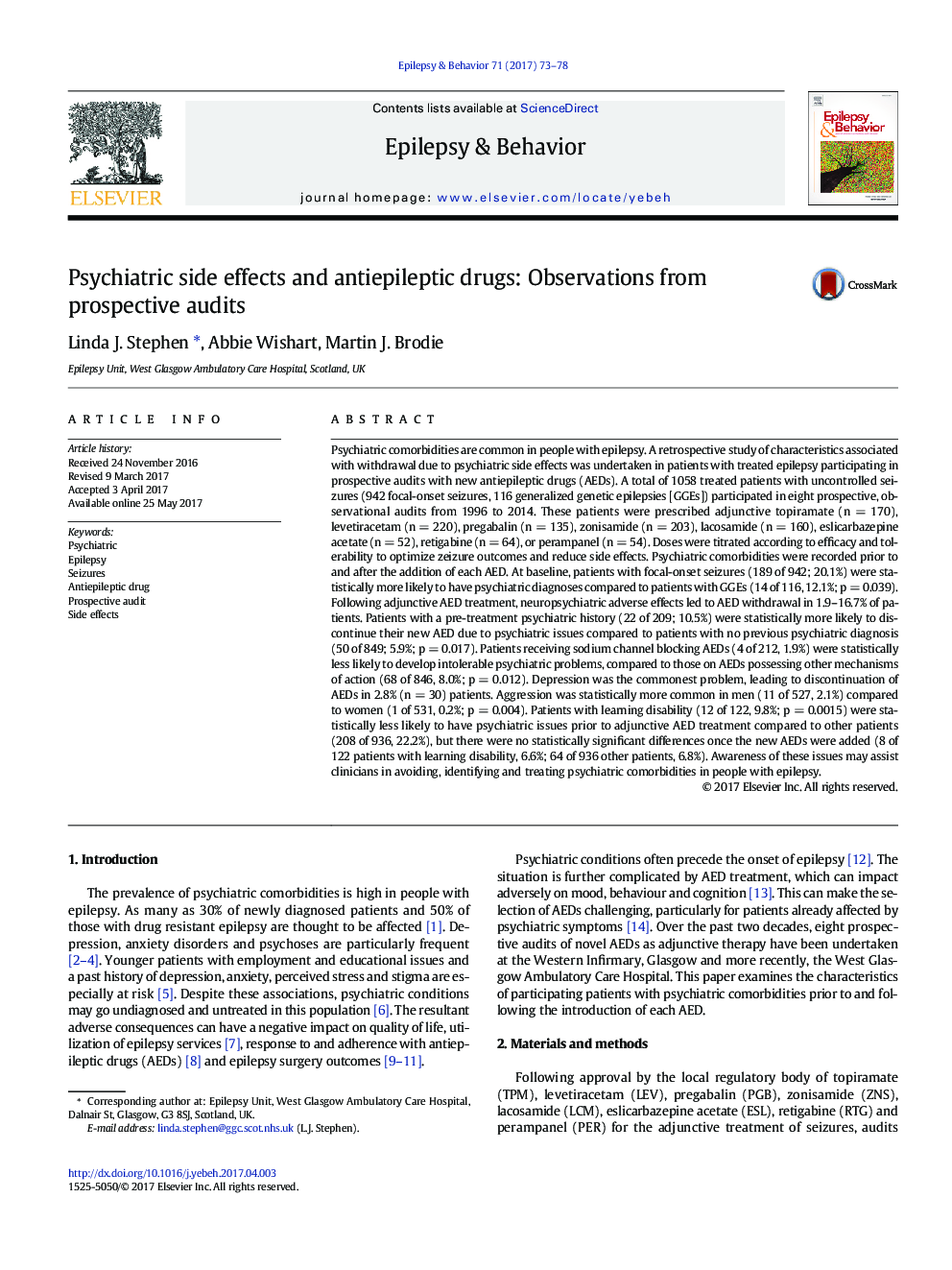| کد مقاله | کد نشریه | سال انتشار | مقاله انگلیسی | نسخه تمام متن |
|---|---|---|---|---|
| 5628193 | 1406367 | 2017 | 6 صفحه PDF | دانلود رایگان |
- Psychiatric comorbidities often co-exist with difficult-to-control epilepsy.
- Depression and anxiety were the commonest diagnoses.
- Men and women were equally affected, aggression was more common in men.
- Psychiatric issues were fewer with Na+ channel blockers than AEDs with other mechanisms.
- A pre-treatment psychiatric history was a risk factor for psychiatric side effects.
Psychiatric comorbidities are common in people with epilepsy. A retrospective study of characteristics associated with withdrawal due to psychiatric side effects was undertaken in patients with treated epilepsy participating in prospective audits with new antiepileptic drugs (AEDs). A total of 1058 treated patients with uncontrolled seizures (942 focal-onset seizures, 116 generalized genetic epilepsies [GGEs]) participated in eight prospective, observational audits from 1996 to 2014. These patients were prescribed adjunctive topiramate (n = 170), levetiracetam (n = 220), pregabalin (n = 135), zonisamide (n = 203), lacosamide (n = 160), eslicarbazepine acetate (n = 52), retigabine (n = 64), or perampanel (n = 54). Doses were titrated according to efficacy and tolerability to optimize zeizure outcomes and reduce side effects. Psychiatric comorbidities were recorded prior to and after the addition of each AED. At baseline, patients with focal-onset seizures (189 of 942; 20.1%) were statistically more likely to have psychiatric diagnoses compared to patients with GGEs (14 of 116, 12.1%; p = 0.039). Following adjunctive AED treatment, neuropsychiatric adverse effects led to AED withdrawal in 1.9-16.7% of patients. Patients with a pre-treatment psychiatric history (22 of 209; 10.5%) were statistically more likely to discontinue their new AED due to psychiatric issues compared to patients with no previous psychiatric diagnosis (50 of 849; 5.9%; p = 0.017). Patients receiving sodium channel blocking AEDs (4 of 212, 1.9%) were statistically less likely to develop intolerable psychiatric problems, compared to those on AEDs possessing other mechanisms of action (68 of 846, 8.0%; p = 0.012). Depression was the commonest problem, leading to discontinuation of AEDs in 2.8% (n = 30) patients. Aggression was statistically more common in men (11 of 527, 2.1%) compared to women (1 of 531, 0.2%; p = 0.004). Patients with learning disability (12 of 122, 9.8%; p = 0.0015) were statistically less likely to have psychiatric issues prior to adjunctive AED treatment compared to other patients (208 of 936, 22.2%), but there were no statistically significant differences once the new AEDs were added (8 of 122 patients with learning disability, 6.6%; 64 of 936 other patients, 6.8%). Awareness of these issues may assist clinicians in avoiding, identifying and treating psychiatric comorbidities in people with epilepsy.
Journal: Epilepsy & Behavior - Volume 71, Part A, June 2017, Pages 73-78
